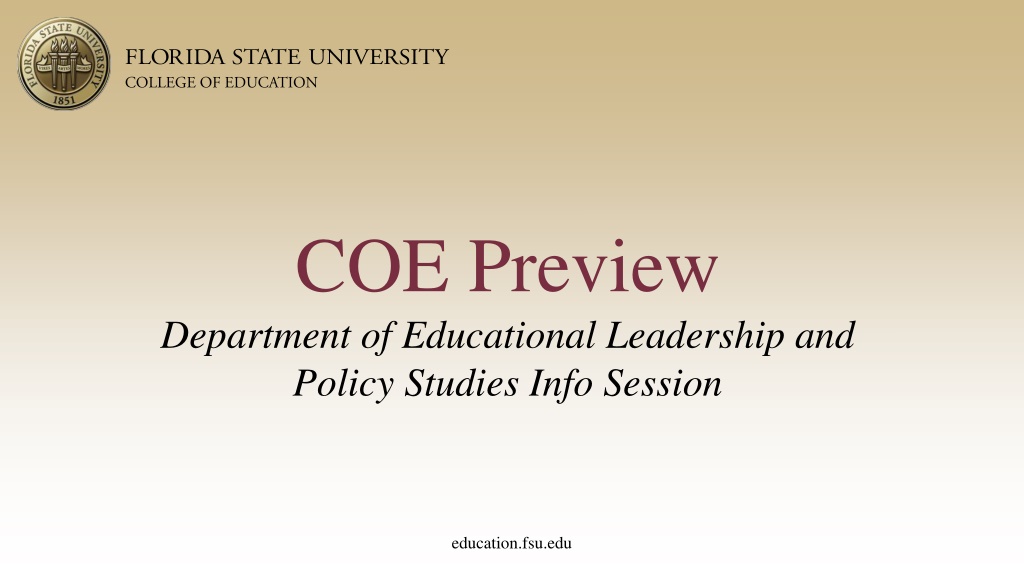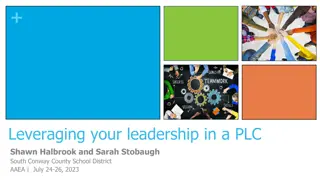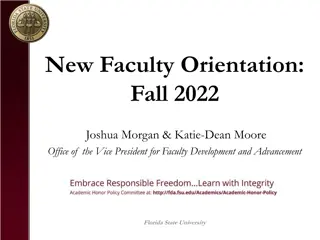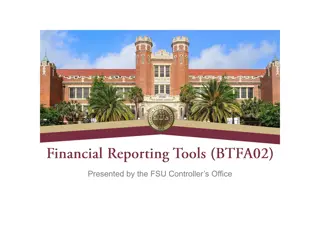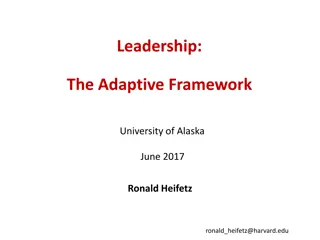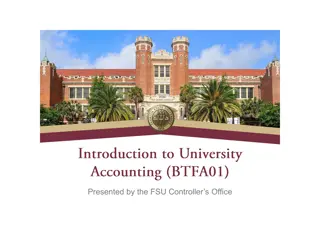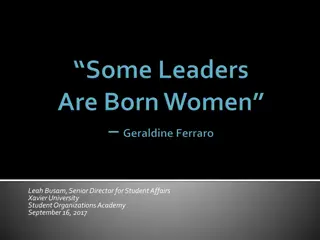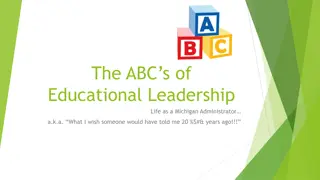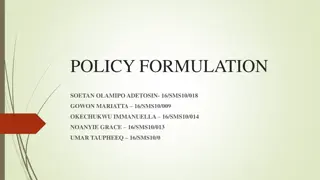Educational Leadership and Policy Studies at FSU Information Session
Department of Educational Leadership and Policy Studies at Florida State University acknowledges and respects the indigenous lands on which the university stands. They focus on educational improvement through interdisciplinary programs, research, and preparing leaders for creating learning environments of excellence and social change. Their strategic priorities include diversity, academic quality, innovation, impactful research, community building, equity, and inclusion. Student demographics show a diverse mix of ethnicities. Degrees and majors offered include Higher Education, Foundations of Education, and Educational Leadership & Policy.
Download Presentation

Please find below an Image/Link to download the presentation.
The content on the website is provided AS IS for your information and personal use only. It may not be sold, licensed, or shared on other websites without obtaining consent from the author. Download presentation by click this link. If you encounter any issues during the download, it is possible that the publisher has removed the file from their server.
E N D
Presentation Transcript
COE Preview Department of Educational Leadership and Policy Studies Info Session education.fsu.edu
Land Acknowledgment We, within the Department of Educational Leadership and Policy Studies at Florida State University, acknowledge that our university is located on the indigenous lands of the Apalachee Nation, the Muscogee (Creek) Nation, the Miccosukee Tribe of Florida, and the Seminole Tribe of Florida. We highlight and pay respect to this history because we understand how the state of Florida and Florida State University came to be settled on these lands. We recognize this land as scarred with a painful past of enslavement, settler colonial violence, the desolation of culture, and the forced removal of indigenous bodies. Despite this, we respect the cultural and ceremonial practices these Indigenous nations maintain in and around Tallahassee today. As educators, we honor the knowledge of these tribes and their people and acknowledge that Indigenous students, faculty, and administrators are vital to Florida State University. We embrace the decolonization of our educational system and commit to disrupting suppressive systems through the explorations of many truths and lived experiences and creating room for those who are often excluded by harmful colonial erasures in our practice and pedagogy.
ELPS Mission The Florida State University Department of Educational Leadership and Policy Studies is focused on educational improvement at all levels. The department offers educational programs on interdisciplinary perspectives that shape theory and inform practice at the local, state, national and global levels. Through collaboration, innovative approaches, and a commitment to partnerships, we engage in research that shapes both policy and practice. We prepare scholars and leaders committed to using critical inquiry and research evidence to create learning environments focused on excellence and social change.
Strategic Priorities FSU Realizing the Full Potential of Diversity and Inclusion COE Academic Quality & Reputation Commitment of Continuous Innovation Promote and Support Impactful Research Community Building Establish Shared Advising Practices Enhance Equity & Inclusion Improve Communication & Collaboration COE Diversity Social Justice COE Partnership & Community Engagement
Student Demographics Latino 2% Non-specified 1% Asian 5% Multiple 16% Student Ethnicity White 53% Black 23% White Black Multiple Asian Latino Non-specified
Department of Educational Leadership & Policy Studies Degrees and Majors Higher Education Foundations of Education Educational Leadership & Policy Educational Leadership/ Administration Education Policy & Evaluation History & Philosophy of Education International & Multicultural Education
Higher Education Program Director, Dr. Cameron Beatty cbeatty@fsu.edu 7
Higher Education Program General information Commitments to: Our pillars: Leadership, Social Justice, Student Success NASPA/ACPA Core Competencies Partnerships with Academic and Student Affairs Our program offers: 20hr assistantships with stipends Tuition waiver with an assistantship Cohort model Also consider the online Ed.D. for students seeking senior-level administrative positions in Higher Education. 8
Master of Science (M.S.) in Higher Education By the numbers 39 hours of course work: Full-time students: 2 years Part-time students: 3 years Cohort model with ~25 students each year Application deadline: December 1st
Master of Science (M.S.) in Higher Education Year 1 Year 2 Foundation & Pillars Intro to Student Affairs Student Development Theory Diversity in Higher Education Leadership Education Insights into Practice Outcomes Assessment Practicum Internships Capstone
Doctor of Philosophy (Ph.D.) in Higher Education 57 hours of course work: 12 hours of core classes 15 elective 9 outside discipline 21 research Plus dissertation Completion timeline: Full-time 4 years; Part-time 5-6 years Cohort model with ~8-10 students each year The application deadline for this program is January 15th; however, applicants interested in being considered for funding, including graduate assistantships, scholarships, and fellowships must apply by December 1st.
Ph.D. in Higher Education Distinctive Features Course Examples Proseminar (Intro to PhD studies) Student Development Theories History of Higher Education Public Policy in Higher Education Organization and Governance Methodological Flexibility Qual, Quant, Mixed Scholarly Engagement Conferences, Trainings, etc. Topical Concentrations Students Affairs Public Policy
Educational Leadership & Administration (EDA)
Program Features DOE-approved program aligned with Florida Principal Leadership Standards leading to Level I Certificate Florida Educational Leadership Examination (FELE) competencies and skills developed and assessed through Signature Assessments throughout the program Fully online Master s (MS) program. For full-time educators who have already earned their Master s, the online Specialist s program (Ed.S.) also provides Level 1 Certification. 2-year cohort model and guided advising for both Master s and Specialist s.
Curriculum and Instruction Mentoring Initiative/Internship (80 hrs working with school and district leaders) to develop real-world skillset, knowledge, and leadership dispositions Field experiences (165 hrs) to operationalize leadership theory, and develop leadership competencies and skills Highly committed instructors with school and district-level leadership experience and research expertise in school and teacher leadership and school improvement Course mentors (successful PhD students) who provide individual supports based on students learning needs.
Program Outcomes FELE Pass Rates Subtest 1: 88% pass rate, state avg. 67% Nationally ranked #3 by U.S. News & World Report for Online Graduate Education Programs Subtest 2: 89% pass rate, state avg. 64% Positive program experience based on the Exit Survey Subtest 3: 84% pass rate, state avg. 59% Successful program graduates as school and district leaders WPA Subtest 3: 70% pass rate, state avg. 57% Highest FELE pass rate in the State of Florida FELE preparation integrated into coursework Competitive tuition rate among state universities FELE Remediation Plan for those who do not pass on the first 2 attempts
Program Components Graduation Requirements Program coursework / Signature Assessment mastery Program Orientation & Expectations Required credit hours: Passing all subtests of the FELE Master s degree 33 hrs 80 hours of mentoring Specialist degree 33 hrs 2 courses per semester = completion in 2 years 165 hours of field experience ESOL requirement Fireside Chat Zoom for new students and potential applicants throughout year
Core Courses aligned with FPLS & FELE Competencies and Skills (9 courses - 27 hrs) Required Elective Courses (2 courses 6 hrs) Practical Experiences in Ed Leadership Teacher Leadership Development Data Driven School Improvement Planning Effective Instruction Leadership for Diversity Instructional Leadership Resource Management for Ed Leaders The Principalship Legal Aspects of Public School Administration Educational Leadership Ethics in Educational Leadership Applications of Policy (Specialist s) Intro to Program Evaluation
Admission Process Application deadlines: Summer 2022 Admission March 1st Fall 2022 Admission June 1st 2 years of teaching experience required Application documents Written Documents Statement of Purpose: 1-2 pages; career goals and interest in educational leadership and the FSU program Essay: 1 page statement describing and analyzing a dilemma related to education leadership R sum Official transcripts 2 letters of recommendation (direct supervisor and professional reference) GRE scores currently waived through Fall 2026
Which track is right for you? Entry Degree Requirement GRE Required Financial Aid/ Scholarship Eligibility Track Credit Hours Master s No* Yes 36 hours Bachelor s Master s No* Yes 36 hours Specialist s Both tracks require applicants to be full-time teachers/administrators in Florida districts. All tracks lead to Level 1 Educational Leadership Certificate. *GRE currently waived through Fall 2026
For program questions, contact: Dr. Chris Small, clsmall@fsu.edu Director of Educational Leadership/Administration Programs For admissions-specific questions, contact: Deb Ham-Kelly, dhamkelly@fsu.edu Program Specialist of Educational Leadership/Administration Programs More information: education.fsu.edu/EDA
Education Policy and Evaluation Our Education Policy and Evaluation graduate program trains you to develop, implement, analyze and evaluate federal, state and local educational policies. Students investigate avenues such as charter schools, urban education reform, school finance, teacher quality, accountability, diversity, to name a few. Faculty Contacts Dr. Patrice Iatarola: piatarola@fsu.edu Dr. Toby Park-Gaghan: tjpark@fsu.edu 22
History and Philosophy of Education The interdisciplinary nature of the History and Philosophy of Education graduate program allows you to take a variety of courses in international and comparative education, educational policy, sociology, history, and philosophy. The program looks at these issues both domestically and internationally, providing you with a comprehensive view of education practices. Faculty Contact Dr. Jeffrey Milligan: jmilligan@fsu.edu 23
International and Multicultural Education Established in the mid-1970s, the International and Multicultural Education program has been continuously ranked among the top comparative and international development education offerings in the country. As such, the program has contributed to the discussion of international education issues and perspectives through original scholarship and research. Faculty Contacts Dr. Ayeshah Khurshid: akhurshid@fsu.edu Dr. Stephanie Zuilkowski: szuilkowski@fsu.edu 24
M.S. Admission Requirements 3.0 undergraduate GPA (if you have a graduate degree or coursework, 3.5 graduate GPA) GRE requirement waived for Summer 2021 and Fall 2021 admissions R sum Statement of purpose Letter of recommendation (3 required) Transcripts Application deadlines February 1 for Summer 2022 June 1 for Fall 2022 25
Ph.D. Admission Requirements 3.0 undergraduate GPA 3.5 graduate GPA GRE: Verbal 149; Quantitative 147; Analytical Writing 3.5 R sum Statement of purpose Letter of recommendation (3 required) Transcripts Application deadline December 1 for Fall 2022 26
Career Opportunities Students who graduate with a master s degree have opportunities to teach, evaluate policies and programs, and develop local, state and federal policies and programs. Doctoral graduates have opportunities to conduct original and influential research in governmental positions, research think tanks and colleges and universities. As of 2010, the median pay for policy analysts is $51,380 a year. For university or college professors, the Bureau predicts a 17% increase in jobs by 2020; totaling 305,700 jobs in the 2010-2020 time span. The median pay is $62,050 per year. 27
Graduate Certificate in Program Evaluation (PE) Dr. Patrice Iatarola, Coordinator piatarola@fsu.edu
Graduate Certificate in Program Evaluation Training and credential for anyone interested in working in program evaluation in the public and private sectors Online and in-person options 4 required courses for Online EdD: EDF 5461 Introduction to Program Evaluation EDF 5462 Evaluation of New EducationalPrograms EDF 5400 Introduction to Basic Statistics EDF 5464 Qualitative Research and Evaluation Methods 1 elective: Select among several advanced research or evaluation courses
Professions in Program Evaluation Social & Community Service Managers Training and Development Specialists Management Analyst Instructional Coordinator Program Evaluator Average Salary: $58,000 - $80,000/year
Admissions for the PE Certificate If not a current FSU student, apply to the university as degree-seeking or non-degree seeking student Complete Certificate Admissions Form Must apply before the completion of two courses towards certificate Must be approved before courses will count for the certificate Not binding/No cost to submit Once submitted, student has 7 years to complete coursework Non-degree course work is not covered under FAFSA or Scholarships
Questions? progevalcert@coe.fsu.edu education.fsu.edu/program-evaluation
Graduate Certificate in Institutional Research (IR) Dr. Christine Mokher, IR Certificate Director cmokher@fsu.edu
Purpose Credential for anyone interested in working in institutional research Degree-seeking (master s and doctoral students) and non-degree seeking students Courses in higher education, assessment or evaluation, and institutional research
Format Fully online With the exception of other methods classes that you may be taking as part of your degree program Practicum completed under supervision of the director of the certificate program
Curriculum 3 required courses: Introduction to Institutional Research Institutional Research Practicum Data-driven Decision Making 2 electives: Intro to Program Evaluation Survey Research Methods One graduate-level research methods or statistical course from ELPS
Professions in Institutional Research Analyze student, faculty/staff, facilities, etc. data for institutional, state, or national policy makers. IR, effectiveness, assessment, planning, and related fields at higher education institutions Average salary ranges (depends on institution type): IR Analyst: $51-65k Director of IR: $65-96k
Professions in Institutional Research Graduates from our IR certificate program have continued on to successful positions including Vice President for Research and Policy at NASPA in Washington, D.C. Director of IR at the University of South Alabama Associate Provost for Institutional Research and Planning at the University of North Carolina-Wilmington Many other positions in the U.S. and around the world
Admissions for the IR Certificate 1. 2. Apply for university admissions (if not a current student) Complete Certificate Admissions Form Must be on file before courses will count towards certificate Due by the end of the semester of the second course taken Not binding/No cost to submit Once submitted, student has 7 years to complete coursework Non-degree coursework is not covered under FAFSA or Scholarships
Questions? ircertificate@coe.fsu.edu education.fsu.edu/ir
Online Doctor of Education (Ed.D.) in Education Leadership and Policy Prepares experienced educational practitioners to become scholar-practitioners and leaders in their local contexts and beyond 3-year program culminating with the Dissertation in Practice Fully online with a 3-day Summer Institute in Tallahassee, Florida each summer Summer (May) start with February 1st application deadline
Admissions Requirements Statement of purpose (~1000 words) must highlight work as a practitioner, explain the decision for Ed.D. pursuit, and outline a potential problem of practice they would like to examine as part of their Dissertation in Practice. Letters of recommendation (3 required) R sum /Curriculum Vitae Official transcripts; must include all colleges attended Graduate degree with at least a 3.5 GPA GRE scores (149V/147Q/3.5A) or waive the GRE requirement with 10 years of professional experience or a completed doctorate degree with a 3.0 or a completed master s or specialist degree with a 3.75
Course Requirements 69 hours 45 hours of coursework (6 fall/spring, 9 summer) 24 hours of dissertation credits With a strong emphasis on policy, coursework is clustered into 3 areas: Educational Foundations and Policy (K-12 or HE) Methodological Approaches Intensive Academic Immersion Experiences
Dissertation in Practice The Dissertation in Practice (DiP) is the culminating project of the ELPS EdD program. The DiP: Consists of empirical research focused on addressing a problem of practice in the student s local context Has elements embedded in coursework throughout the program
Questions? Program questions Dr. Eric Ludwig, Director, eludwig@fsu.edu Admissions process questions Deb Ham-Kelly, Academic Program Specialist, dhamkelly@fsu.edu
